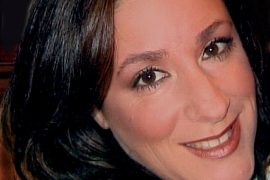What does it mean to be an exercise physiologist?
I do exercise testing and personal training at a large, new, state-of-the-art fitness center. The two main tests I conduct are a resting metabolic-rate test, which tells you how many calories your body typically burns at rest (then you can, hopefully, figure out how many you should consume!); and cardiovascular tests, which reveal how cardiovascularly fit you are. Using those results, you can work at the right heart-rate zone to burn fat. I also do strength and flexibility assessments.
And clearly, this requires some mathematical calculations.
I do a little math everyday. Sometimes I’m converting meters to feet or miles. I work a lot with percentages, particularly heart rate percents. Often, I put some raw data into a computer program to get those percentages. Other times it is on the fly with a calculator, always with a calculator. I work with percentages of heart rates for training goals or with disease management cases. I also work in terms of percentages of fat, to weight, and to muscle. Once in a while a computer program doesn’t work and I have to do some algebraic equations by hand, old school. I don’t remember the formulas so I have to look them up.
How do you think math helps you do your job better?
Exercise science is a science, and it should be precise. I measure fitness levels (body composition, strength, flexibility and cardiovascular), prescribe exercise, and try to help clients achieve a certain percent increase in one thing, or a certain percent drop in another, and then measure again. If I get these things wrong, clients are less likely to see results, and in my job, I need to produce results.
How comfortable with math do you feel?
The math I do now I feel comfortable with. I know the basics well. When you throw out numbers to people, when you know numbers, people tend to listen more. When I’m presenting to my department head I always double-check my math.
What kind of math did you take in high school?
I was awful in Algebra. I had to work three times harder than everyone else just to get by. After the basics, math made little sense until I got to study stats in grad school. I found some more purpose in it.
Did you have to learn new skills in order to do this math?
Most of the math that I use at work or shopping at Costco I learned in school.
Want to know more about the math involved in fitness and nutrition? Check out my book Math for Grownups, which will be out on July 18! And if you know of anyone who uses math in surprising ways in their work, please let me know.





